
Related
Guests
- Rick Rowleyaward-winning filmmaker and an independent journalist with Midnight Productions.
- Lawrence Wrightauthor, screenwriter, playwright and a staff writer for The New Yorker magazine.
Two years ago, in a story that shocked the world, Saudi journalist Jamal Khashoggi entered the Saudi Consulate in Istanbul for marriage documents and was never seen again. It was later revealed that Khashoggi — a Saudi insider turned critic and Washington Post columnist — was murdered and dismembered by a team of Saudi agents at the direct order of Crown Prince Mohammed bin Salman. We speak with a friend of Khashoggi and with the director of a new documentary, “Kingdom of Silence,” that tracks not only Khashoggi’s brutal murder and the rise of MBS, but also the decades-long alliance between the United States and Saudi Arabia. “What drew me into this story is Jamal was one of our own,” says director Rick Rowley. “When one of our colleagues is killed, it falls on all of us as journalists to try to do what we can to rescue their story from the forces that would impose silence on it.”
Transcript
AMY GOODMAN: This is Democracy Now! The Quarantine Report. I’m Amy Goodman, with Nermeen Shaikh.
Friday marks the two-year anniversary of the brutal assassination of the exiled Saudi journalist Jamal Khashoggi inside the Saudi Consulate in Istanbul, Turkey. In a story that shocked the world, Khashoggi entered the consulate October 2nd, 2018, for marriage documents, his fiancée waiting outside. He was never seen again. It was later revealed that Khashoggi, a Saudi insider turned critic and Washington Post columnist, was murdered and dismembered by a team of Saudi agents at the direct order of Crown Prince Mohammed bin Salman.
Two years later, the prince has not been held accountable, remains a close ally of the U.S. government. Last month, a Saudi court issued prison sentences of between seven and 20 years for the eight defendants in Khashoggi’s murder, but the trial and verdict did not address who ordered the killing. Agnès Callamard, the U.N. special rapporteur on extrajudicial executions, called it “a parody of justice.”
We turn now to a new Showtime documentary about the assassination. It tracks not only the brutal murder of Khashoggi and the rise of Crown Prince Mohammed bin Salman, but also the decades-long alliance between the U.S. and Saudi Arabia. It’s called the Kingdom of Silence. This is the film’s trailer.
MOHAMED SOLTAN: This man was a noble man, courageous man, very serious about the evolution that he was making.
MAGGIE MITCHELL SALEM: He was threatened and intimidated all the time.
UNIDENTIFIED: The Saudi monarchy operates like a mafia. And you don’t cross the godfather.
JOHN BRENNAN: There is no way that that horrific act was carried out without the blessing from the very top of the Saudi government. Just no way.
PRESIDENT DONALD TRUMP: We’ve become very good friends over a fairly short period of time.
BEN RHODES: Mohammed bin Salman was feted in Washington. Every aspect of American power rolled out the red carpet for this guy. Jamal Khashoggi was one of the only dissenting voices.
MOHAMED SOLTAN: To speak freely, he knew what the stakes were.
UNIDENTIFIED: Jamal was publishing articles that were critical of the Saudi regime.
MARWAN BISHARA: That could not be tolerated.
LAWRENCE WRIGHT: To what extent was the Saudi government entangled with al-Qaeda? Is there a person in the world that knows more than Jamal Khashoggi? He had made a huge sacrifice. His children are being held hostage.
MAGGIE MITCHELL SALEM: “You are in a war, and you can’t give up. You can’t disappear.” Those are the last words I said to him.
NAWAF OBAID: The moral of the story is that there is no moral. I mean, what is the morality of this?
AMY GOODMAN: That’s the trailer for Kingdom of Silence. The new documentary airs on Showtime tomorrow — that’s Friday — the two-year anniversary of the death of Jamal Khashoggi.
For more, we’re joined in New York by the film’s director, Rick Rowley, Oscar-nominated, Emmy-winning filmmaker and independent journalist with Midnight Productions. And in Austin, Texas, Lawrence Wright is with us, a Pulitzer Prize-winning author, screenwriter, playwright, staff writer for The New Yorker magazine, featured in the film. He’s also the executive producer, and friend of Jamal Khashoggi.
We welcome you both to Democracy Now! Rick Rowley, let’s begin with you. I remember the last time you were in studio, you were just starting this documentary. The significance of what happened on this week, two years ago, when The Washington Post correspondent walked into that Saudi Consulate in Istanbul? Talk about what you learned and what the world now knows happened next.
RICK ROWLEY: Thank you, Amy. It’s great to be back here.
I mean, I think really what drew me into this story is the fact that Jamal was one of our own. Jamal was a journalist who was murdered by the regime that he criticized. And, you know, when one of our colleagues is killed, it falls on all of us as journalists to try to do what we can to rescue their story from the forces that would impose silence on it.
So, you know, in a very short period of time, we learned a lot about the murder. I mean, we began this project kind of as a murder mystery, right? And so, we did the things that you do when you begin that sort of investigation. We met with multiple national intelligence agencies. We reviewed classified intel. We tracked down insiders who had never spoken before, and found new details about the killing.
But very quickly, it became clear that there were far more important and interesting questions here at stake, not just did the crown prince and the Saudi royal family order his execution — we know that he did. There’s a consensus among global intelligence agencies that that’s what happened, and there’s an overwhelming evidence, you know, everything from the planes that were used to the electronic communications to recorded — transcripts of recorded conversations inside the consulate, that make it clear that that’s what happened. So, not just did that happen, but why; not just how this gruesome killing was carried out — we know that now in granular detail — but who was this man, Jamal, who the kingdom would risk so much to silence.
And so, those deeper questions propelled us then on a much longer journey, that spans multiple continents and 20 months of production, to really find out that question. And Jamal’s life really turned into an epic story. I mean, he was — Jamal was more than just a journalistic witness. He was a participant in some of the events that — most important events of our time, events that continue to structure the way that we live the world today. And he played all these kind of amazing roles. And his story is kind of this story of transformation and redemption, but also a roadmap to this toxic relationship between the U.S. and Saudi Arabia that has sown violence and chaos around the region for decades.
NERMEEN SHAIKH: Lawrence Wright, as Rick said, Jamal Khashoggi was a participant in some of the key events that continue to shape the way the world is today, starting with the Soviet invasion of Afghanistan, his coverage of that war and of the resistance, including, of course, the role played by Osama bin Laden, whom he met and whose cause at the time he believed in, as did the U.S. They shared an interest then: the defeat of the Soviets. One of the people interviewed in the film, Marwan Bishara of Al Jazeera, also says that throughout the history of U.S.-Saudi relations, Jamal was there at the crossroads either reporting, explaining or spinning. Could you give an account of his role in documenting the relationship between the U.S. and Saudi Arabia, and how he eventually came to dissent from the Saudi royal family, how that happened and when?
LAWRENCE WRIGHT: Well, as a young man, Jamal actually studied in America, so he was used to — you know, he spoke English. He knew his way around the West. But then he was also in the Muslim Brothers, as was bin Laden, which was a forbidden organization in Saudi Arabia.
Then he became a reporter, when the jihad against the Soviets took place. And when I say he became a reporter, you have to understand, Amy, how unusual that is in Saudi Arabia. Actually going out and carrying out the task of journalism is rarely done. And there are lots of things you’re not allowed to speak about. But he became an actual war correspondent, going to Afghanistan and interviewing people and sending in dispatches.
And it was there that he and bin Laden became close, not just as friends, but there was a relationship, a professional one, in — you know, Jamal was chronicling the jihad. And in the process of writing about bin Laden, he was enlarging this young man’s image. So, in some respects, you know, Jamal fashioned the myth that surrounded Osama bin Laden. And that would link them together for the rest of their lives.
AMY GOODMAN: Lawrence Wright, let’s go to the Kingdom of Silence, featuring Jamal Khashoggi in his own words about Afghanistan.
JAMAL KHASHOGGI: Afghanistan was the major Islamic cause in Saudi Arabia in the ’80s. Americans did not want to appear as if they are in direct war with the Soviet Union. So, we and Saudi Arabia and Pakistan were doing a cover-up on the operation, which was an open secret. Everybody knew about it, this Saudi-American-Pakistani campaign to drive the Soviet Union out of Afghanistan. I do not deny that I had sympathy toward the Afghan cause, because I myself come out from Islamic circles. And I still believe it was a just cause. And Saudi Arabia should be appreciated for that. And it was a big story, which kind of made my name in the field of journalism.
AMY GOODMAN: The words of Jamal Khashoggi himself, murdered two years ago on Friday. Lawrence Wright, take us from his relationship with Osama bin Laden, what happened in Afghanistan — and this is where he rose as a war correspondent — and why the current regime saw him as so threatening when he turned against them, given his knowledge of what that Saudi relationship was with Osama right through to bin Salman’s rise, which is synonymous with the genocide in Yemen.
LAWRENCE WRIGHT: Yeah, Amy, when bin Laden and Jamal returned to Saudi Arabia, they were different men. Bin Laden was famous. I think of him as being like Saudi Arabia’s first celebrity, because that’s a category that didn’t exist until bin Laden came home in Saudi Arabia. There was the royal family, and there’s everybody else. And, you know, the royal family owns all the newspapers. They own almost all of the satellite channels in the Arab world. They control the narrative.
And then, you know, Jamal comes, and he’s gotten a voice. He’s become a well-established journalist, which itself is exceptional in that country. And he set out to expand the zone of what you could say in Saudi Arabia. Now, I worked in the Saudi press for a while, and I learned that there are three things you can’t talk about: You can’t talk about the government, you can’t talk about the royal family, and you can’t talk about religion. So it takes a lot off your plate. But Jamal was willing to speak, and he was not — he was not afraid. That was the thing that really stood out to me about Jamal, because people were so worried about what they might say. They were worried about the consequences even then. Jamal understood what the parameters were, but he was willing to work inside them and try to enlarge that space.
And that’s, really, eventually what killed him. He had gotten too big for his britches, as far as the royal family was concerned. They began to cut back on his ability to publish. And even when they shut down his Twitter, he realized that it was over for him in Saudi Arabia and there was no room for his voice. And so he came to America, and he started writing for The Washington Post. Now, you cannot imagine what a big deal that was in Saudi Arabia. He is working for one of the most important newspapers in the world, inside the capital, where all the lawmakers get up every morning and read that newspaper. What a powerful platform that was! It was unheard of in Saudi Arabia. It was a countervailing force that they simply couldn’t tolerate.
NERMEEN SHAIKH: Well, Lawrence Wright, if we could just talk a little bit about when Khashoggi separated, when his interests separated, he stopped supporting the royal family? It’s not just that he initially backed the jihadis fighting the Soviets in Afghanistan, but he also supported the U.S. invasion of Iraq, which could not have been fought without Saudi support.
LAWRENCE WRIGHT: Right.
NERMEEN SHAIKH: But then, when the Arab Spring began, he was surprised by the uprisings across the Arab world. And it had something to do with those uprisings, his distancing from the royal family.
LAWRENCE WRIGHT: You’re totally right. I mean, in 2003, I visited Jamal in Asir, in southern part of the country. And he had been made editor of a newspaper there. And he was the only Saudi I met who was in favor of the war. And I said, “Why? Why do you support it?” And he said, “Because we need a push. You know, we are so paralyzed in this country.” And the only force that was great enough, in his opinion, that could change the Arab world was the United States. So he thought that this would be a push towards democracy. And, of course, it turned out so catastrophically.
And then, he came to — you know, at that point, he was really under death threat. And it was Prince Turki who rescued him and took him to be his spokesperson in London, and then in Washington, where he served as ambassador. That was a period of dutiful service on the part of Jamal for the royal family.
But then, along came the Arab Spring. And this was transformative for Jamal. He suddenly saw that there was a popular movement in the Arab world and that people felt as he did, that there should be a larger space for ordinary people to express themselves and to have fulfilled lives. And he was very enthusiastic about it. And, you know, even at the end of his life, Amy, he was going around — there’s a diaspora of the people that were involved in the Arab Spring, many of them in the U.S., and Jamal was going around rallying them, trying to put them back together again as a movement. And so, I think that that was really the moment that his life totally changed.
AMY GOODMAN: We’re going to go to break, then come back to this discussion. We’re talking to the Pulitzer Prize-winning journalist Lawrence Wright, who was a friend of Jamal Khashoggi, and the Emmy-winning filmmaker Rick Rowley, who just did Kingdom of Silence. He just won, along with Jacquie Soohen, the Emmy last week for investigative journalism for their documentary on the killing of Laquan McDonald, a young African American teen, by Chicago police. Stay with us.
[break]
AMY GOODMAN: “Blue Monk” by Thelonious Monk. This is Democracy Now! The Quarantine Report. I’m Amy Goodman, with Nermeen Shaikh. Friday marks the second anniversary of the murder of the exiled Saudi journalist Jamal Khashoggi inside the Saudi Consulate in Istanbul, Turkey. We’re talking to Rick Rowley, director of a new documentary, out tomorrow, about Khashoggi called Kingdom of Silence, and with Lawrence Wright, Khashoggi’s friend. He’s author and Pulitzer Prize winner. I want to go to another clip from Kingdom of Silence. This looks at the day The Washington Post published Khashoggi’s first op-ed, headlined “Saudi Arabia wasn’t always this repressive. Now it’s unbearable.” It was September 2017.
MOHAMED SOLTAN: Fall of 2017, Jamal was in self-imposed exile. We met, and he gave me the biggest bear hug. It was really, really warm. And then he started crying. He said, “I left my country, I left my family behind for freedom. Just to be free. And no one knows what that feels like more than you.” I learned later that his first Washington Post article was published that hour.
JAMAL KHASHOGGI: [read by Nasser Faris] “Saudi Arabia wasn’t always this oppressive,” by Jamal Khashoggi. “We spend endless hours on the phone trying to understand this wave of arrests … are we going to be the core of a Saudi diaspora? … Al-Hayat, canceled my column. The government banned me from Twitter … I spent six months silent, reflecting on the … stark choices before me. [Y]ears ago when several friends were arrested[,] I said nothing. … I have made a different choice now. I have left my home, my family and my job, and I am raising my voice.
AMY GOODMAN: Those are the words of Jamal Khashoggi, that are read by someone else. That was the piece he had in The Washington Post. Rick Rowley, talk about what would then happen and about bin Salman coming to the United States, not just hailed by the president, but hailed by business leaders, proudly getting the red carpet all over this country, and what this meant, how dangerous this was for the man who was now turned against the leadership.
RICK ROWLEY: Yeah. So, Jamal is a man who, throughout his life, saw his heroes, heroes who he had championed in the press, who he had helped create the stories and the myths around — he saw them turn into villains before his eyes and commit crimes that he felt himself to be implicated in, you know, from September 11th and Osama bin Laden to the murder of the Arab Spring. And he was wounded by those crimes that he saw, and transformed by them. And his story is a story of continual transformation. So, after the Arab Spring is — he watches the princes he spent his life serving murder the hope of the Arab Spring in the streets of Cairo and elsewhere. Then the rupture begins between him and the Saudi regime, and he becomes a critic and then is forced into exile. And he ends up a martyr.
But when Jamal comes to the States and he begins publishing in The Washington Post, he’s one of the only dissenting voices in the U.S. that is critical at all of the new regime. Saudi Arabia, in many ways, depends on the United States. The United States has been Saudi’s security guarantor for — you know, since the beginning, and has time and again defended it. So they recognize the importance and the value of American public opinion, and they invest incredibly heavily in it. Saudi Arabia dumps billions of dollars into Hollywood. They’re linchpin investors in Silicon Valley, aside from all the money they spend inside the Beltway, bankrolling almost all of the think tanks that cover the Middle East, endowing chairs at most of America’s elite universities that have Middle Eastern studies departments. So, today, if you turn on cable news and you see an expert talking about Saudi Arabia, the odds are very high that they have — part of their salary is paid for by the kingdom itself.
So, when MBS came to power, he came on this sort of victory lap through the United States, where he met everyone, you know, from Bill Gates to The Rock to Oprah, you know, I mean, every cultural and political figure in Washington, New York, L.A. or Silicon Valley or Seattle. And there was this unanimous [inaudible], in spite of the fact that at the same time he was doing this, he had dragged the U.S. into this — what the U.N. calls the greatest humanitarian catastrophe of our time, this massive war crime that is the Saudi and American attack on Yemen.
So, Jamal is the lone voice in Washington, D.C., speaking out against this or criticizing, even in gentle ways, this new regime. And that made him incredibly dangerous to Saudi Arabia. That is compounded by the fact that Jamal knew so much. He was an insider, the ultimate insider, not just someone who has the ear of powerful people inside the royal court, but someone who was working closely with Saudi intelligence and was at this nexus of, like, the CIA in Saudi Arabia and Islamists not just in Afghanistan, but, in the decades afterwards, throughout the region. So, he knew things that would be incredibly damaging to the royal family and to the U.S.-Saudi relationship.
NERMEEN SHAIKH: And, Lawrence Wright, we have 30 seconds. MBS, Mohammed bin Salman, was hailed as a reformer in the U.S. when he came and met all of these important people across every industry. You, yourself, believed he was a reformer. What made you change your mind?
LAWRENCE WRIGHT: My last conversation with Jamal, I was asking him about that. And the thing that Jamal told me is that, you know, there’s no room for anyone else’s voice. And, you know, like the women who wanted to drive, he’s granted them driving, but he’s locked up the women that proposed it, and tortured them. So, the message that’s gone out from those actions is, “I’ll do the deciding here. Nobody else has a voice in this kingdom except for me.”
AMY GOODMAN: And at the end, after Jamal Khashoggi was murdered and President Trump was asked about this, when the CIA director said it was clearly from orders from the top, President Trump’s response was “America first.” He was not going to change his support of the Saudi regime. I want to thank Rick Rowley, director of Kingdom of Silence, and Lawrence Wright. We will do a post-show with Lawrence Wright on his book.


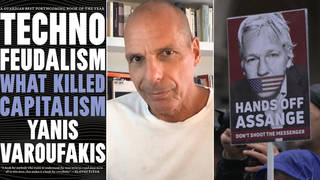
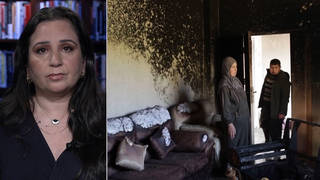
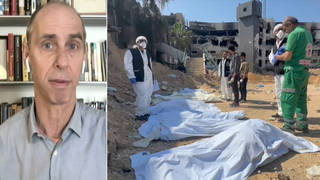





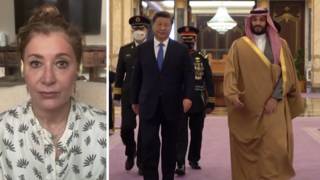
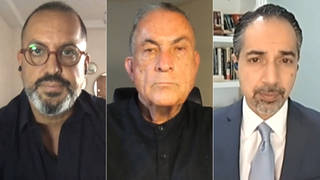
Media Options